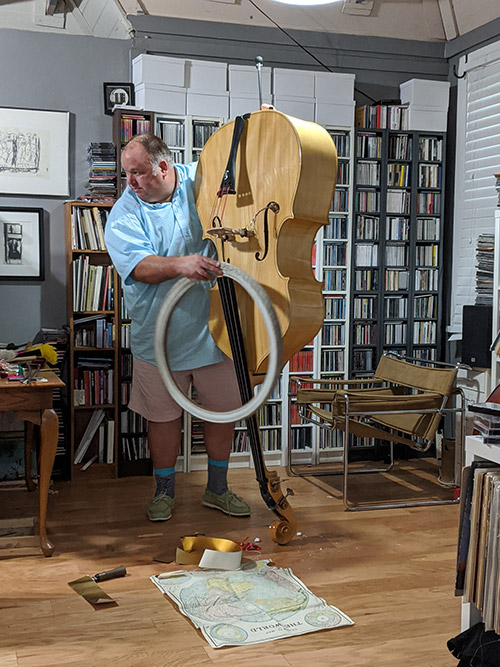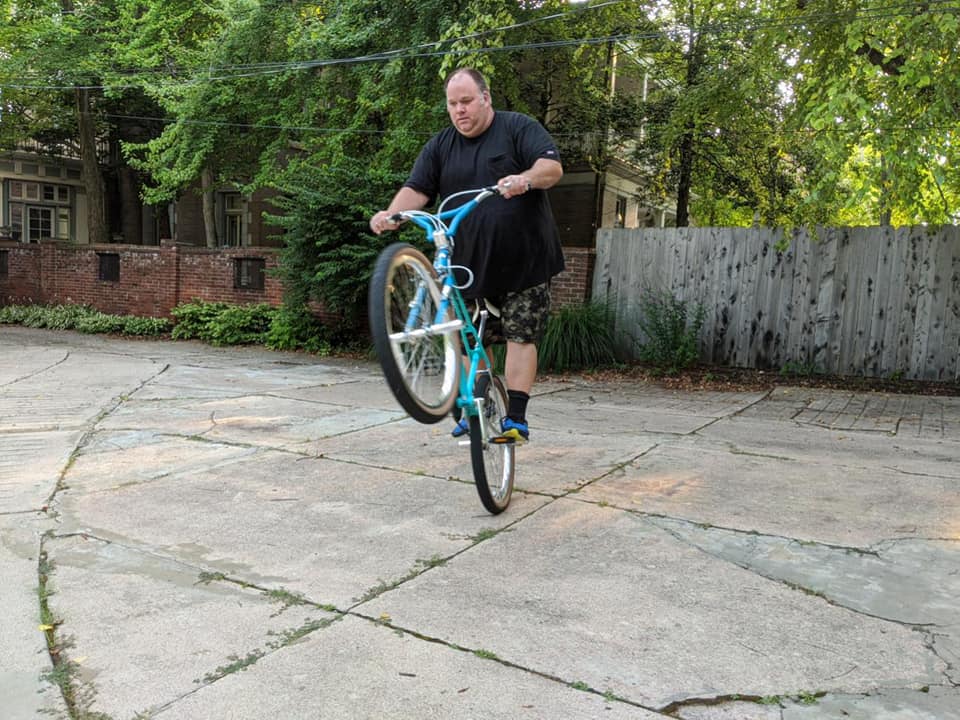Damon Smith
The Squid's Ear Interview

How would you describe music?
Best not to define it, I think it is shifting all the time. However, Cage said, "you don't have to call it music if the term offends you". I might define "Improvised music" as living long-term with the sounds & ideas you get from instrumental research & and testing those sounds in many contexts to see what they can do and how they develop.
What is your relationship to music?
As a listener I prefer recordings to live music & I listen daily. I like to pick the LPs or CDs I will listen to in the morning the night before and read the liner notes in bed. All physical media unless I am flying somewhere, then it is an old 80g iPOD. My morning listening is either new releases of creative music or recordings related to my upcoming projects.
When I want more tonal or traditional music I tend to listen classical music or straight ahead jazz.
I don't use pop music in my life at all. When I need a break from serious listening I turn to bad TV, comedians and bicycling. The only sound I like more than music is the sound of a perfectly dialed in BMX bike.
As far as playing: I love practicing. I practice mainly traditional, classical double bass etudes and solo music. I have two practice areas with a bass and bow in each place. I often practice twice a day if my playing schedule is not heavy.
I play the bass for a few minutes each morning before turning on any recorded music or looking at the internet.
I have profound aversion to private playing with others, rehearsals and "sessions".
There is something extremely special about creating music in the moment for an audience that never gets old.
What draws you to the instrument(s) you play, and/or to composing?
Originally, it was seeing Mike Watt play the bass guitar with the post-minutemen band fIREHOSE. He remains an inspiration and does more and more experimental music as time goes on. He has played a lot of my work on the Watt From Pedro Show. Next, it was really hearing the wood, hair and strings from the way Peter Kowald played the bass. I still feel like no one has gotten to the center of the instrument like he has.
What deceased performer(s), improviser(s), or composer(s) would you most like to have a conversation with, and why?
Obvious answer, but: it would be Mingus for a lot of reasons, not just about music.
What musician(s) most influenced your approach to music, and why?
Since I covered the bass inspirations above, then I'd still list my main bass teachers, Lisle Ellis was my primary teacher, it was incredible to have someone like him help get my head around the instrument. I've had a lot of lessons and workshops with great players but Bertram Turetzky & Mark Dresser have been my guides for the last decades.
Apprenticing with Marco Eneidi was crucial as well. He taught me so many things, I will always be grateful for the time he spent with me.
If I am picking one I've listened to deeply, then Cecil Taylor's work has been huge for me.
A few other bassists are important because they helped expand my work beyond Kowald:
Torsten M�ller & Hans Schneider both had a dry, rich textural style that has been incredible to dive into.
Next would be the great Barry Guy. Firstly, the level of high velocity interaction pioneered by Parker/Guy/Lytton and secondly, the fast yet precise turn over of ideas, techniques and textures.
None of the other bassist who had the technical level to take up that challenge, even just in terms of the technical physical ability to do it, were focused on it, so I stepped in. You need a couple of people working on a set of ideas to see what is on the other side. The inventor may not even be the one who finds out since they are often refining what they already found. I was concerned it would be a "lost language". Happily, there are a few others now like Kyle Motl & Caleb Duval doing fantastic & original work in that area.
The very first track on Kowald's Duos: Europa LP is a duo with Jo�lle L�andre - that album made me play the double bass.
From that track to whatever latest release she has, she is a constant inspiration.
Who or what influences you most outside of music, and why?
I think It was reading things Steve Lacy said that pushed me to see the connections with visual art and literature. I read poetry everyday, a few current favorites would be Aase Berg, Nathaniel Mackey & Paul Celan.
I pretty seriously engaged with visual art and I have amassed a small but serious art collection of small works, prints and multiples & Artists Books from artists like Joseph Beuys, Sigmar Polke, Lawrence Weiner, Gilbert & George, Gunther F�rg, Jasper Johns, Anulf Rainer, Bruce Conner, Ben Patterson, Jenny Holzer & George Herms. As well as musicians like Br�tzmann, Kowald, Gunther Christmann & Marilyn Crispell.
Still, nothing is as important to me as the work of Cy Twombly.
What advice would you give to a young musician entering your field?
Get a stereo system with a CD player and turntable. Track down the CDs of the music especially, look at the cover art and read the liner notes. The best writing on the music is trapped in the liner notes of physical releases!
What do you hope audiences take away from experiencing your music?
Live, I hope they take away whatever they need. I do hope people take time to notice the way that I put my albums together and resonances between the cover art I pick and how I source the titles as well as who writes the liner notes or poems.
For the titles, I sort of look for resonances, often with literature or poetry. It could be the poetry I was reading at the time or something the music evokes. The resonances are often close but, at other times they are wider. Twombly talked about finding myths or poems with a similar atmosphere to his paintings.
Where are you currently located or musically associated with?
I am in St. Louis, MO and the scene is fantastic! There are a lot of great players right now, but it is fair to say my work here is anchored by Alex Cunnigham & K. Curtis Lyle.
Chicago is not far, so I've been able to keep my work with Jerome Bryerton, particularly in trio with Guillermo Gregorio, going and I have an excellent trio with Jason Stein & Adam Shead that trio has had has had both Marilyn Crispel & Roscoe Mitchell as a guest artist.
Roscoe's quartet with Sandy Ewen, Weasel Walter has been able to do a bit of work with both Weasel & me in the midwest. Work with Jaap Blonk has continued with a recent trio tour with the great Michael Zerang.
What is your musical education or background?
I learned basic theory from my mom, who is a composer then studied with the great bassists listed above.
What are some of your favorite recordings by other musicians or groups?
So many. To keep it simple:
When the Sun is Out, You Don't See Stars on FMP by Peter Kowald/Werner L�di/Butch Morris/Sainkho Namtchylak
What are some of your favorite recordings that you have made?
Many of the obvious ones, like the work with Kowald, Moses, Fielder, Fuchs & Roscoe.
One I wish was recieved better is the double CD of trios with Keith Rowe & Sandy Ewen with Rowe staging Scratch Orchestra works with Sandy's all female group that she based on simliar principles of the Scratch Orchestra without knowing. The cover has these great Twombly Poloroids and the liner notes tie it all together.
Search for
Damon Smith
titles on Squidco.

Comments and Feedback:



More Recent Reviews, Articles, and Interviews @ The Squid's Ear...


|
|

